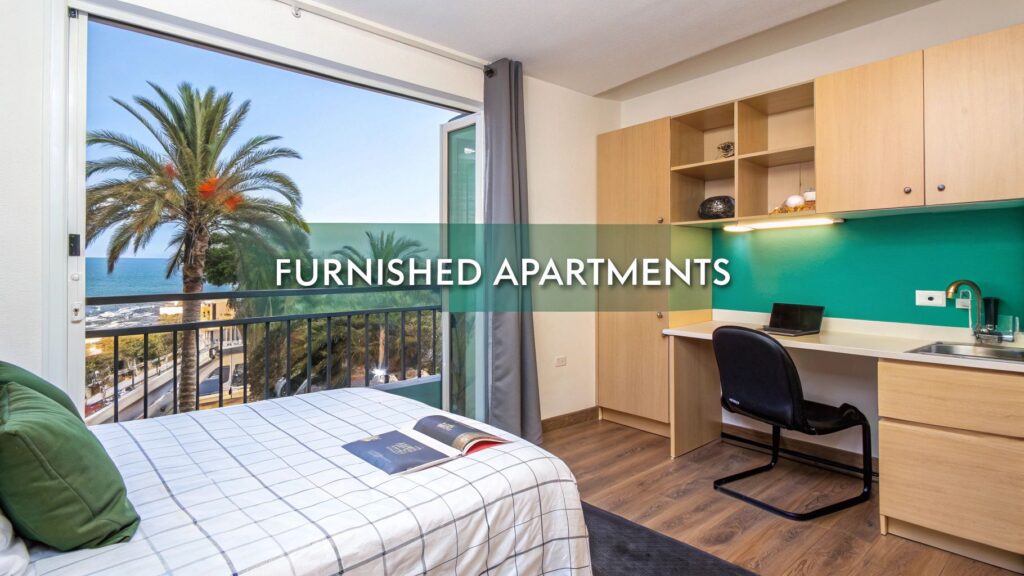Think of a furnished student apartment as a "starter pack" for college life. It’s a move-in-ready solution that completely sidesteps the stress, high costs, and logistical nightmares of buying and moving furniture. This makes your transition to life in Boca Raton incredibly smooth.
Why Furnished Apartments Are a Smart Choice for Students
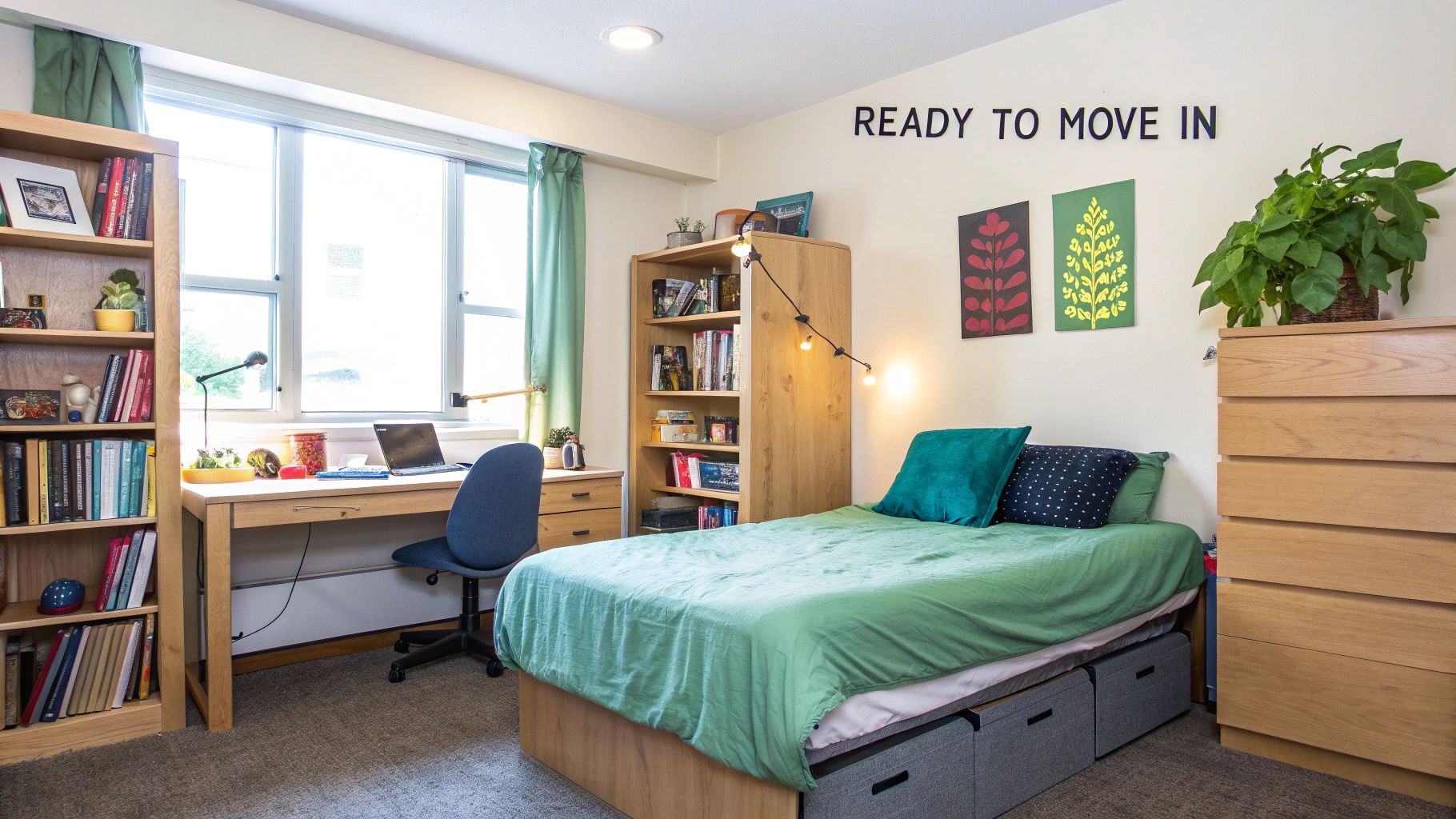
Moving to a new city for college is a massive undertaking. Between figuring out your class schedule, making new friends, and just keeping up with your coursework, the last thing you need is the chaos of furnishing an entire apartment from scratch. This is where furnished units really prove their worth.
The Power of Convenience
Imagine showing up in Boca Raton with just your suitcases and personal items, ready to settle in immediately. That’s the real magic of a furnished apartment. You don't have to worry about coordinating furniture deliveries, trying to decipher flat-pack assembly instructions, or renting a U-Haul. Everything you need is already waiting for you.
This convenience is a game-changer for a few key reasons:
- Less Move-In Stress: You can focus on orientation week and meeting people instead of spending it at a furniture store.
- More Free Time: Your weekends are for studying or hitting the beach, not for building a desk.
- Instant Comfort: The essentials are already in place, chosen to fit the space and make it functional from day one.
A Financially Savvy Decision
At first glance, the monthly rent for a furnished apartment might look a bit higher, but it often works out to be the more economical choice over the length of your degree. The student housing market is booming, and competition is fierce—preleasing for Fall 2025 hit nearly 90% by June. That's a clear signal of just how high the demand is.
Choosing a furnished apartment is a strategic financial move. It converts a massive, one-time capital expense—buying all new furniture—into a predictable, manageable monthly operational cost.
This approach means you don't need a huge chunk of cash or to rack up credit card debt just to make your apartment livable. For a more detailed breakdown of the numbers, you can explore our guide on furnished vs. unfurnished apartments in Boca Raton.
To help you see the differences at a glance, here’s a quick comparison of what you can expect with each option.
Furnished vs Unfurnished Quick Comparison for Students
| Feature | Furnished Apartment | Unfurnished Apartment |
|---|---|---|
| Upfront Cost | Lower (typically just security deposit & first month's rent) | High (deposit, rent, plus the cost of all furniture & moving) |
| Move-In Effort | Minimal (bring your personal belongings) | High (requires buying, moving, and assembling furniture) |
| Convenience | Maximum convenience, ready to live in immediately | Low convenience, requires significant time and planning |
| Customization | Limited to decor and smaller personal items | Full control over furniture style, layout, and quality |
| Monthly Rent | Slightly higher to cover the cost of furniture | Lower base rent, but you own and maintain the furniture |
| Move-Out | Simple, just pack your personal items and clean the unit | Complex, involves selling or moving all your furniture |
Ultimately, a furnished apartment simplifies the financial and logistical hurdles of moving, allowing you to focus on what really matters: your education and new experiences in Boca Raton.
What to Expect in a Furnished Student Apartment
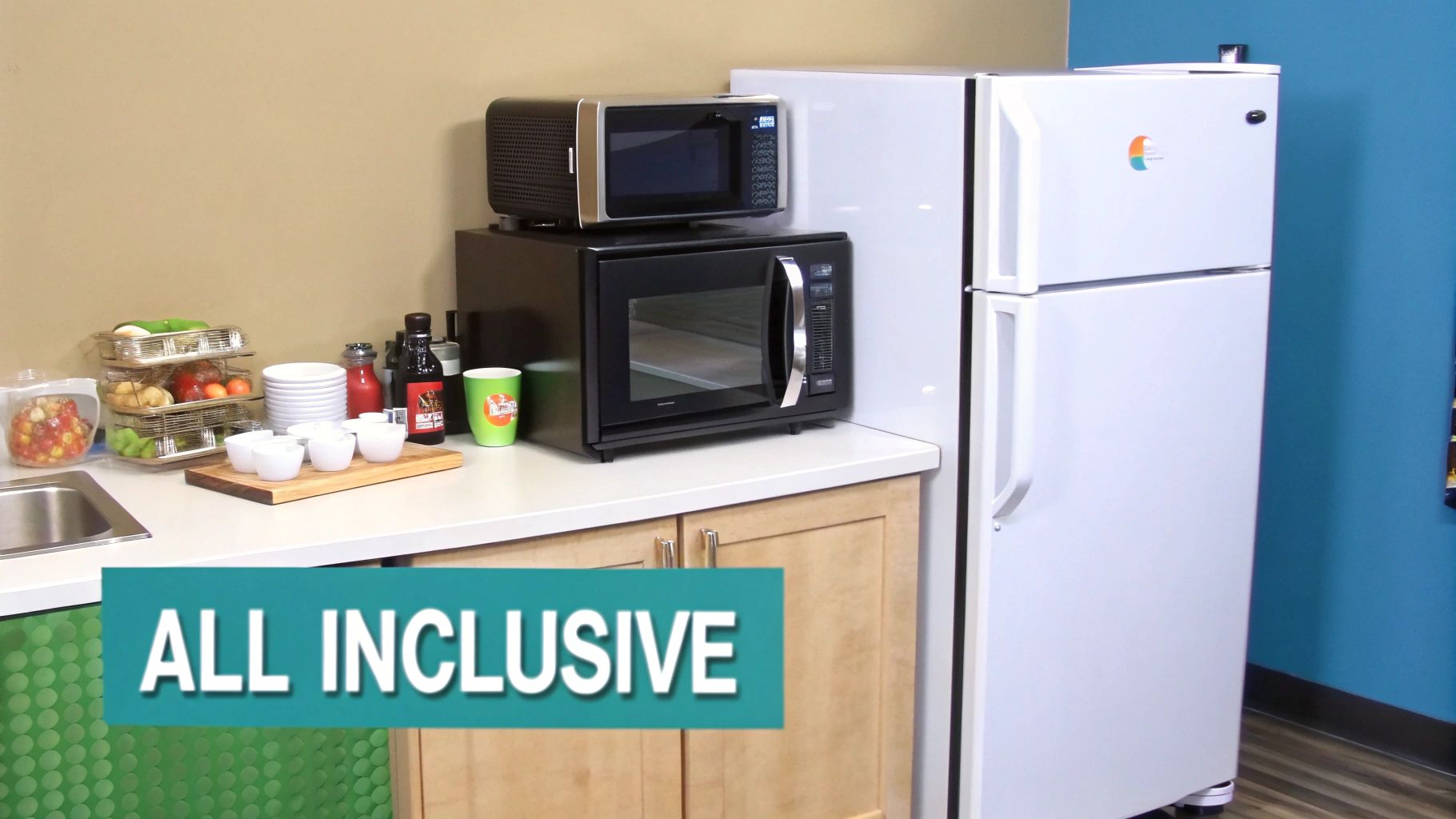
The word "furnished" gets thrown around a lot, but what does it actually mean for a student apartment? It's more than just a room with a bed thrown in. Think of truly great furnished apartments for students as a complete "move-in ready" kit designed for your college journey.
Everything you need to live, study, and unwind is already there from day one. This means you skip the classic student struggle of moving into an empty box and then spending a frantic week (and a lot of money) hunting for furniture. A good furnished place gives you a solid foundation so you can focus on making it feel like home, not building it from the ground up.
The Standard Furnishings Checklist
While the exact items can vary from one complex to another, any decent furnished student apartment should cover the essentials in every main area. As you tour different places, keep this checklist in your back pocket. It's a quick way to gauge if a landlord really gets what a student needs.
Here’s a general rundown of what you should be looking for:
- Living Room: This is your social and relaxation hub. It should have a durable sofa, a coffee table, and maybe an end table or two. Good lighting is a must, so look for lamps. Some apartments will even include a media stand for a TV.
- Bedroom: This is your personal sanctuary for sleep and study. At a minimum, you’ll need a bed frame and mattress, a nightstand, and a dresser. The non-negotiable items? A proper desk and a comfortable chair for all those late-night study sessions.
- Kitchen & Dining Area: This is where the real convenience kicks in. A furnished kitchen should always come with the big stuff: a refrigerator, stove, and microwave. You'll also need a dining table and chairs, so you're not eating every meal on the couch.
Moving into a furnished apartment is like opening a pre-assembled toolkit. Instead of spending weeks hunting for the right tools and putting them together, you can start your project—your college education—on day one.
Beyond the Basics: What to Look For
The best student housing communities, like Cynthia Gardens, don't just stop at the basics. They know that student life, especially near FAU, is about more than just having a roof over your head. The furniture you'll find is often chosen specifically for its durability and smart design—built to handle the reality of a student's busy schedule.
You might notice thoughtful details, like a layout that cleverly creates separate zones for studying and socializing, even in a cozy one-bedroom unit. These touches are a dead giveaway that the space was designed for students, not just rented to them. It’s always a good idea to ask the property manager for a detailed inventory list before you sign anything. That way, there are no surprises.
Understanding the True Cost of Furnished Rentals
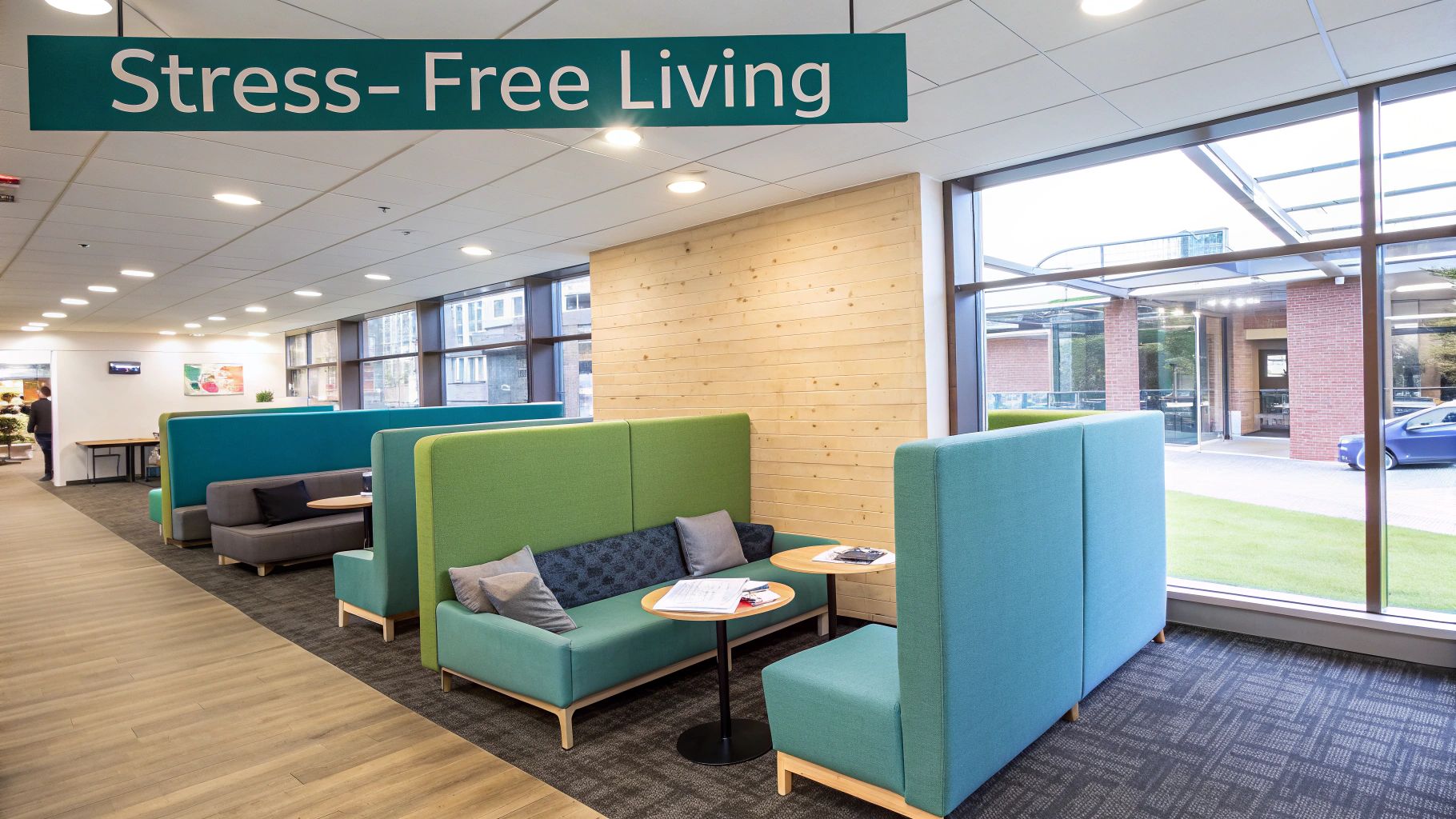
When you're hunting for college housing, it's natural to fixate on the monthly rent. But that sticker price doesn't tell the whole story, especially when you're weighing a furnished apartment against an empty one. To get the real financial picture, you have to dig a bit deeper.
At first glance, the monthly rent for a furnished place might look a little higher. What you're really seeing, though, is a bundled cost that saves you a ton of money and stress elsewhere. Think of it this way: a furnished unit takes the massive, upfront hit of buying furniture and spreads it out into a predictable monthly expense.
Breaking Down the Hidden Costs
An empty apartment is a blank slate, but filling it comes with a surprisingly long shopping list. These are one-time costs that can wipe out your savings before you even buy a single textbook—and they’re completely sidestepped with a furnished rental.
Let's ballpark what it takes to set up an unfurnished place from scratch:
- Major Furniture: A bed and mattress, a dresser, a desk and chair, plus a sofa and small dining set can easily run you over $2,500.
- Moving Expenses: Just renting a U-Haul, grabbing boxes, and maybe bribing friends with pizza can add a few hundred dollars to the bill.
- The "Little Things": You'd be amazed how quickly lamps, curtains, pots, pans, and silverware add up.
With furnished apartments for students, all of that is already taken care of. Those costs are simply baked into your rent, spread thinly across your lease. You aren't just renting four walls; you're getting a ready-to-go living space.
The real win with a furnished apartment isn't just skipping the initial shopping spree. It's about avoiding the nightmare of what to do with all that stuff when you graduate.
Long-Term Financial Sense
Think about it over the course of a four-year degree—the logic gets even stronger. Finding good, affordable student housing is a challenge everywhere, and as Business Research Insights points out, the market is shifting to provide better solutions that fit student lifestyles.
A furnished rental completely removes the end-of-lease chaos. You won’t be trying to sell a used couch on Facebook Marketplace for pennies on the dollar or forking over cash for a storage unit all summer.
When your time in Boca Raton is up, you just pack your bags and go. That simple, clean exit saves an incredible amount of time, energy, and money, making it a genuinely smart financial move for your entire college career.
How to Choose the Right Location in Boca Raton
When you're a student in Boca Raton, location is more than just a convenience—it's everything. Picking the right neighborhood is a strategic decision that shapes your entire college experience. It's the difference between a smooth, connected daily life and a constant battle against traffic and inconvenience.
Think of it as finding the sweet spot in your own personal "student lifestyle triangle." One corner is your campus (like FAU), another is your daily necessities (groceries, banks, a good coffee shop), and the third is your downtime (the beach, parks, restaurants). Your ideal apartment should sit right in the middle of it all.
The Student Lifestyle Triangle
A great location means less time commuting and more time for what you’re actually here for—studying, making friends, and maybe even getting a little sleep. Before you even step foot in a potential apartment, you can do some serious reconnaissance from your laptop.
Fire up your favorite online map and start digging:
- Map Your Commute: Check the drive, bike, and walk times to campus. Pro tip: check it during the times you’d actually be going to class, not on a Sunday morning.
- Locate Essentials: Where’s the closest Trader Joe's or Publix? How about a 24-hour pharmacy or a quiet spot to study off-campus?
- Plan Your Downtime: How long will it take to get your toes in the sand? Find the nearby parks, gyms, and local hangouts.
Doing this homework transforms a random address on a website into a tangible vision of your day-to-day life.
A great location is a built-in time-saver. Every minute you're not spending on a long commute is a minute you can invest in your grades, your friendships, or your well-being.
Why Proximity Pays Off
Living in a well-placed community like Cynthia Gardens really brings this idea to life. When you’re close to campus, you can pop back home between classes for a real lunch instead of grabbing something expensive on the go. This kind of proximity doesn’t just save you money on gas and parking; it fundamentally changes how you engage with the university.
You're way more likely to hit up a campus event, join a last-minute study group, or actually use that massive library you're paying for when it's just a quick trip away.
For anyone new to the area, finding centrally located apartments for rent near FAU can make all the difference. It sets you up in a supportive environment where everything you need is right there, letting you focus on what matters and truly enjoy everything Boca has to offer.
Getting to Grips With Your First Lease Agreement
Staring at your first lease agreement can feel like trying to read a foreign language. It’s dense, full of legal jargon, and frankly, a little intimidating. But don't let that wall of text scare you. At its core, a lease is just the official rulebook for your new home—a clear agreement between you and the landlord that sets expectations for everyone.
Signing on the dotted line for one of the many furnished apartments for students is a huge milestone, but it's not something to be rushed. This document spells out every single one of your rights and responsibilities. Taking a moment to really understand it is the best way to protect yourself and ensure a smooth, headache-free year.
What to Look For in the Fine Print
Your lease will detail everything from when rent is due to whether or not you can hang posters with nails. While every property has its own specific rules, there are a few non-negotiable clauses you absolutely need to understand before you commit.
- The Lease Term: This is simply the length of your rental agreement. Is it a standard 12-month lease, or does it follow the 9-month academic calendar? This detail is huge, especially when you're trying to figure out your summer plans.
- Furniture Wear and Tear: This clause is unique to furnished places. You need to know what the landlord considers "normal use" versus what they'd call "damage." A small scuff on a desk leg is one thing; a giant coffee stain on the sofa is another.
- Personalization Rules: Dreaming of a cool accent wall? The lease will tell you if that's okay. Always check the rules on painting, drilling holes, or making other changes before you start decorating. It’s the easiest way to get your full security deposit back.
"Your lease isn't just a piece of paper you sign and forget. It's the roadmap for your entire time living there. Understanding it from day one prevents misunderstandings and empowers you to be a great, and protected, tenant."
Questions to Ask Before You Sign
Never be afraid to ask questions. A good property manager expects them and will be happy to clarify anything that seems fuzzy. This simple conversation can save you from major stress later on. For a more detailed guide, be sure to read these smart tips for navigating apartment lease agreements.
The student housing scene is getting more competitive, with properties working hard to attract students by offering better amenities and more flexible terms. As university enrollment grows, so does the demand for high-quality living spaces. You can see how the student housing market is evolving from Walker & Dunlop to understand the bigger picture.
Here are the essential questions you should ask before signing anything:
- How do you handle maintenance? Is there an easy online portal, or do I need to call someone? More importantly, what’s the turnaround time for emergencies like a broken A/C in the Florida heat?
- What's the move-out process like? Do you provide a cleaning checklist to follow? When can I realistically expect to get my security deposit back?
- What’s your policy on guests and subletting? Can my friend from home crash on the couch for a week? And if I have a 12-month lease but go home for the summer, can I sublet my room?
Your Action Plan for Securing an Apartment
Feeling ready to find your perfect student apartment? Awesome. With a little bit of strategy, the process can be surprisingly smooth. Let's break down the whole journey into clear, manageable steps that will take you from the initial search right up to getting the keys in your hand.
Start Your Search the Smart Way
First things first: figure out what you actually need. Grab a piece of paper or open a new note on your phone and make two lists. One is for your non-negotiables—the things you can't live without, like being a short walk from campus or having a washer and dryer in the unit. The other is for your "nice-to-haves." This simple exercise will keep you focused from the get-go.
Next, get smart with your search terms. Instead of just typing "apartments in Boca" into Google, get specific. Try phrases like "furnished apartments for students near FAU" or "one-bedroom rentals close to the beach." This small tweak works wonders, filtering out all the noise and showing you properties that are actually a good fit for student life.
This visual lays out the simple, three-stage process for finding and securing your apartment.
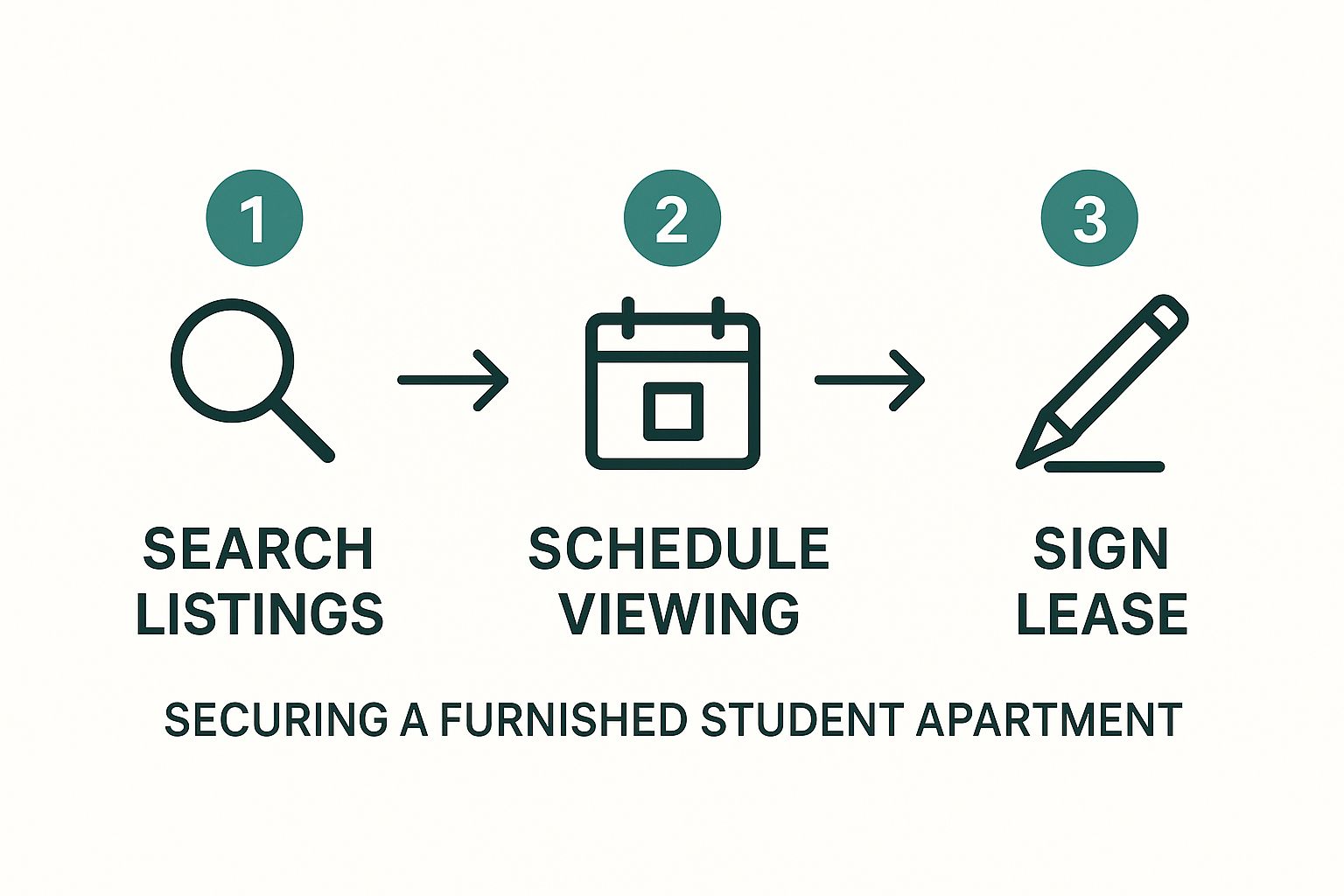
As you can see, the path from browsing online to signing a lease has a few key milestones. A little preparation at each stage makes all the difference.
Master the Apartment Tour and Application
Once you have a few viewings scheduled, it's time to put on your detective hat. Don't just breeze through the unit. You need to inspect it with a critical eye.
- Document Everything: Use your phone to take pictures and videos of the apartment's condition, especially the furniture that comes with it. This creates a visual record that can be invaluable for getting your full security deposit back down the road.
- Test the Essentials: Seriously, turn on the faucets to check water pressure, flick every light switch, and open all the cabinets and drawers. You want to know that everything is in good working order before you commit.
- Check Online Reviews: See what current and former tenants are saying. Pay close attention to comments about property management and how quickly they respond to maintenance requests.
Before you even go on a tour, get your paperwork in order. Having your proof of enrollment, photo ID, and any co-signer information ready to go can put you at the front of the line.
Finally, when you get the lease agreement, read it. Read every single word. Don't let anyone rush you. Make sure you completely understand all the terms, particularly the clauses about maintenance and security deposits, before you put your pen to paper. This final check is what empowers you to sign with total confidence.
Got Questions About Furnished Student Apartments? We've Got Answers.
Stepping into the world of student rentals for the first time? It's totally normal to have a few questions. When you're looking at furnished apartments for students, getting clear on the details ahead of time can save you a lot of headaches later. Let's tackle some of the most common things students ask.
A big one is always about personal furniture. Can you bring your favorite armchair from home? Usually, yes. Small, personal items like a desk chair, a nightstand, or a bookshelf are almost always fine. What you can't do is ask the landlord to haul out the big stuff they already provide, like the bed or the sofa. It's always a good idea to double-check with the property manager before you start packing the U-Haul.
What’s the Deal with Utilities and Damages?
Another point of confusion is often utilities. How do they work? Honestly, it depends on the building. Some places bundle everything into an all-inclusive package, meaning your rent covers water, electricity, and Wi-Fi—sometimes with a monthly spending cap. Other apartments will have you set up and pay for those accounts yourself. You’ll want to get this sorted out from the start so you can budget properly.
Pro tip: Before you move a single box in, walk through the apartment and take photos or a quick video of all the furniture. This creates a timestamped record of its condition and can be your best friend when it’s time to get your security deposit back.
So, what happens if you accidentally break a lamp or stain the couch? Your lease agreement will have a section covering damages. In most cases, you’ll be on the hook for the repair or replacement cost. This is usually taken out of your security deposit, which is exactly why that initial photo documentation is so crucial. If something does get damaged, let management know right away.
Ready to find a furnished apartment that feels like home? Cynthia Gardens offers serene, spacious, and move-in-ready one-bedroom apartments perfect for students near FAU. Explore our floor plans today!
